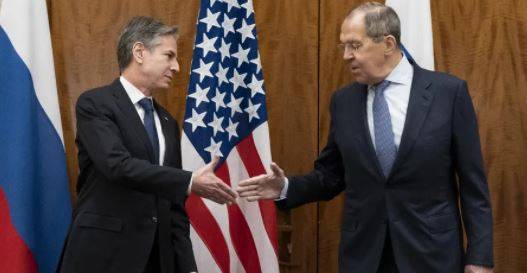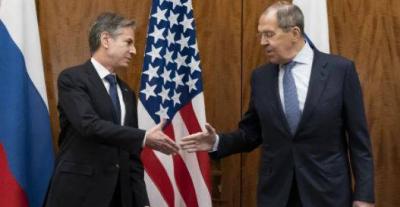Russian Foreign Minister Sergey Lavrov stated on Friday that he does not expect any "breakthrough" during talks with his U.S. counterpart Antony Blinken at the outset of their meeting in Geneva, aimed at easing the Ukrainian crisis. Lavrov informed Blinken that he does not anticipate progress in their discussions but wants a specific response to Moscow's security demands.
In comments made at the beginning of the meeting, broadcast on television, Lavrov said, "Our proposals are very specific, and we expect equally specific answers." The meeting in Geneva comes amid Western concerns over a potential Russian invasion of Ukraine. Russia denies any invasion plans but has indicated it may take unspecified military action if a list of demands is not met, including a NATO pledge not to accept Ukraine as a member.
While sitting face-to-face, Blinken warned Lavrov at the start of their talks, expected to last around two hours, of a "unified, swift, and severe" response if Russia invades Ukraine, yet emphasized that the United States continues to seek a diplomatic solution.
The meeting, held in a palace overlooking Lake Geneva, was expected to last no more than two hours, after which both ministers would make separate statements to the press. Lavrov and Blinken, who know each other well, shook hands around 10 AM GMT and engaged directly in discussions even before journalists were asked to leave the room.
This meeting marks the latest step in an intensive diplomatic effort that began 11 days ago in Geneva between their aides. U.S. Deputy Secretary of State Wendy Sherman tweeted late at night that the Americans and their allies extended a hand, but "so far our goodwill gestures have been rejected."
Russian Deputy Foreign Minister Sergey Ryabkov responded to a reporter's question about what Russia fears by saying, "Russia is not afraid of anyone, not even the United States." He added that "the American attempt to increase tensions yesterday and the day before did not create the necessary climate for talks. We will try to make the Americans change their tone and encourage them to work according to our agenda regarding security guarantees."
Washington and its allies have repeatedly threatened severe consequences, such as harsh economic sanctions – rather than military action – against Russia if it were to invade, with approximately 100,000 Russian troops stationed near the Ukrainian border for weeks.
After meeting with the Ukrainian president in Kyiv and senior diplomats from Britain, France, and Germany in Berlin this week, Blinken was prepared for a face-to-face meeting with Lavrov, which appears to be a potential last effort for dialogue and a negotiating agreement, although both sides remain steadfast in their non-negotiable positions for now. Blinken warned in Berlin on Thursday of a swift and severe response from the U.S. and its allies should an invasion occur. The U.S. Treasury Department imposed new sanctions on four Ukrainian officials, stating that these four were central to Kremlin efforts that began in 2020 to undermine Ukraine's ability to "act independently."




